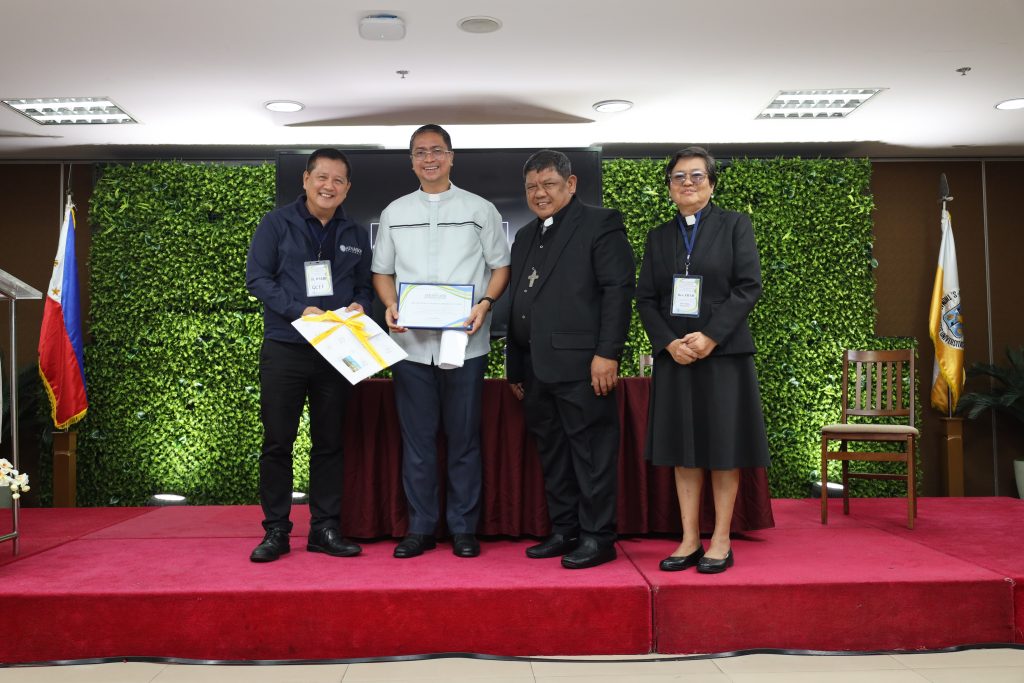The University of Santo Tomas (UST), through the Graduate School (GS), Research Center for Theology, Religious Studies and Ethics (RCTRSE), Faculty of Theology, and the Institute of Religion (IR), hosted the 2nd Inter-Seminary Forum on Ecumenism, themed “From Conflict to Communion: Journeying in Hope Toward Christian Unity.”

The forum gathered theological educators, seminarians, and church workers from various Christian traditions and was opened by Most Rev. Mel Rey Uy, D.D., Bishop of Lucena, who encouraged participants to work toward the unity expressed in the prayer: “That they may all be one.” Through keynote speeches, breakout sessions, and testimonies, attendees deepened understanding, explored the roots of division, and proposed paths forward in the ecumenical journey.
In her Keynote Address, Ms. Nilda Castro, from Mariapolis Peace, Focolare Movement Philippines, tackled the forum’s theme, “From Conflict to Communion: Journeying in Hope Toward Christian Unity,” by highlighting the causes of Christian division and exploring the efforts towards healing. She first noted the Great Schism of 1054, which split the Roman Catholic and Orthodox Churches over disputes like the filioque clause. She then examined the Protestant Reformation in the 16th century, highlighting key figures such as Martin Luther and John Calvin. While these events led to a fragmented Christian landscape, Castro noted milestones in modern ecumenism, including the formation of the World Council of Churches and the 1999 Joint Declaration on Justification.
In response, Ms. Aileen Alava-Orillaza of the Asian Theological Seminary presented a post-colonial perspective on Philippine ecumenism, linking denominational fragmentation to colonialism and local tribalism. She advocated for “contextual ecumenism,” emphasizing dialogue that goes beyond doctrinal differences to engage with marginalized communities, using concepts like “loob” (inner self) to foster unity.
The forum featured four concurrent sessions exploring ecumenism across various disciplines. The first session focused on Biblical Hermeneutics and Ecumenism, specifically examining the Lord’s Prayer, “Our Father,” in both Matthew and Luke. The second session addressed Morality and Ecumenism, where participants explored ethical divergences among Christian denominations, particularly in the areas of sexual ethics and bioethics. The third session revolved around Pastoral Theology and Ecumenism, focusing on John 3:16–17. Participants emphasized the importance of pastoral sensitivity and mutual respect in ecumenical dialogue, advocating for churches to act as agents of reconciliation amidst social disparities. Finally, the fourth session dealt with Spirituality and Ecumenism, emphasizing the relational nature of spirituality—engaging with God, others, and creation. The group underscored the importance of shared practices, such as prayer and hospitality, as vital for fostering genuine spiritual ecumenism and facilitating mutual transformation.
The forum featured compelling personal testimonies, including those of Rev. Erahvilla Maga-Cabillas of the Philippine Independent Church (IFI), Senior Pastor Rev. Leonard Arevalo, and members of the Focolare Movement and the Rizal Ecumenical Group.
In the afternoon plenary session, Rev. Fr. Cecilio Vladimir Magboo, O.P., S.Th.D., delivered a comprehensive theological reflection on Catholic ecumenism in the Philippines. In his sharing, Fr. Magboo proposed a framework for ecumenical conversion that consists of four components: Head – reforming theological thought and education; Hands – embodying unity through shared mission and service; Heart – cultivating a sense of affectivity and beauty in the ecumenical experience; and Holy – pursuing Christ-likeness together. He introduced the concept of “receptive ecumenism,” suggesting that churches should grow not by imposing their beliefs but by learning from one another. Fr. Magboo cautioned against the dangers of ecclesial self-sufficiency and instead advocated for humble self-criticism and a renewed willingness to journey alongside others. Furthermore, he emphasized that ecumenism must extend beyond doctrinal agreements and shared recognition of baptism. It should lead to a common witness and cooperative action in the world.
In a forward-looking initiative, the forum outlined the essential components required to establish a unified platform through the appointment of student representatives from various theological institutions. This effort aims to foster collaboration on a shared ecumenical framework, grounded in a fourfold dialogue model effectively adapted from interreligious practices.
The 2nd Inter-Seminary Forum on Ecumenism at UST transcended a mere scholarly conference; it was a living testament to the Gospel’s call for unity. From historical analysis to personal testimonies, and from theological discussions to shared prayer, the forum exemplified a beacon of hope in action. It reaffirmed that the journey from conflict to communion is challenging yet achievable and urgently necessary.
This event was organized in collaboration with the Catholic Bishops’ Conference of the Philippines – Episcopal Commission on Ecumenical Affairs, the National Council of Churches in the Philippines, St. Vincent School of Theology, and the Quezon City Ecumenical Fellowship.


